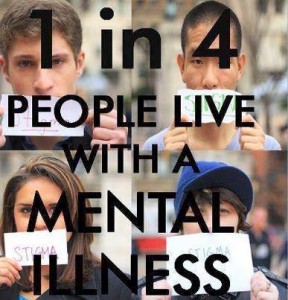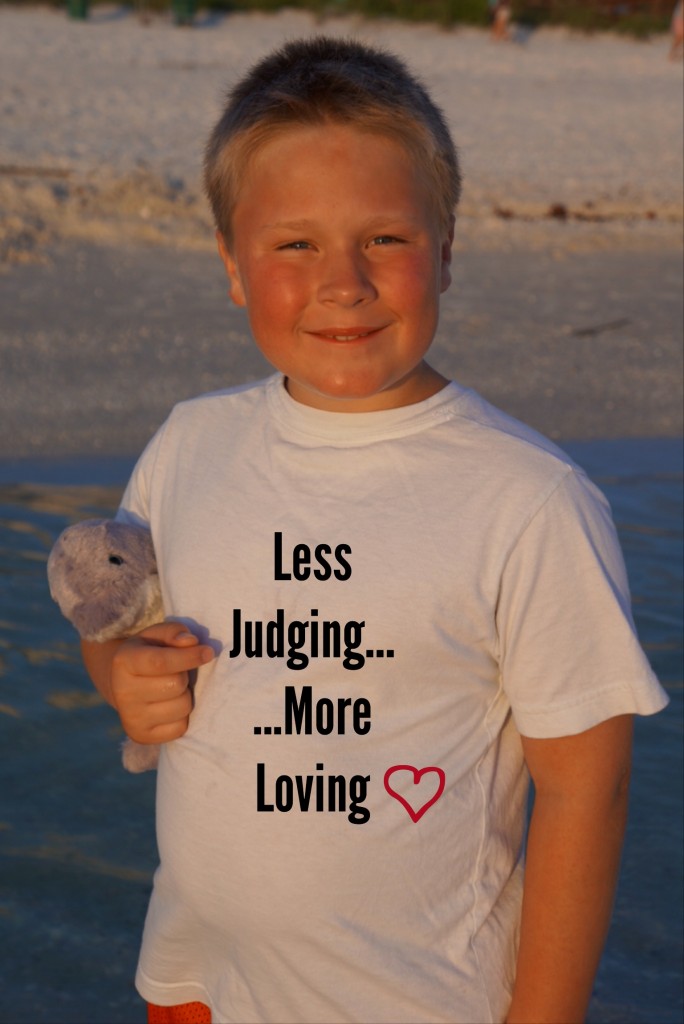What do you think someone looks like who suffers from mental illness? Do you think they look like this?
In today’s society, our social media streams are filled with all kinds of awareness week notifications. The amount of requests we receive to ‘like this’ or ‘share that’ to help bring awareness to multiple causes can be overwhelming, especially when we already have causes of our own that we champion. But I ask for you to consider one more. One that is very close to my heart.
Did you know that this week is Mental Illness Awareness Week (#MIAW)?
If you follow this blog, or my social media streams, you know my life is touched by mental illness. Actually, ‘touched’ seems too small of a word. My life has actually been enveloped or has coexisted with mental illness for the last three years. I’ll save the specifics for another blog post, but for those new to my story, it goes something like this…
…There once was a boy. An amazing, smart, emotionally intelligent boy, who at the age of 8 had to be treated for depression and anxiety after several incidents of dangerous and risk taking behavior, including multiple attempts at hurting himself…
This boy is my eleven year old son. We still don’t have a clear picture on all that happens inside my son’s brain, but we do know this. We know that he suffers, wait…no, he lives with mental illness. Sometimes he does suffer from it. But we’re working hard to make the days of suffering less than the days of living, striving and celebrating.
Because of our experience, I’ve become very passionate about the cause and determined to do all I can to help my son and others who walk this path. One of the first things I noticed during our journey with mental illness is the the stigma attached to it. I started sharing what my son and I were going through with others I knew, friends…family…coworkers. And I often got similar responses or comments from them that went something like this, “Wow. I can’t believe you’re sharing this with me. You’re so brave to talk about it.”
This was strange to me, because it really never dawned on me to do anything but talk about it. Of course, I’ve always had the propensity to over share…so there’s that, but it still seemed like sharing was the only option. Initially, my need to talk about it was because I needed the support. I needed hugs and kind words, prayers and good wishes. Eventually, it became such a part of our life, that it was difficult to do anything but share our experiences. And the more comments I got about my bravery for sharing, the more determined I felt to make sharing anything but brave. In fact, I wanted to make sharing normal.
It became obvious the stigma attached to talking about mental illness was immense, larger than life. Yes, we’ve seen an increasing openness in people talking about having a ‘shrink’, but it’s almost always shared in some sarcastic or joking manner. And this tells me we are still not quite ready to accept people’s regular visits with therapists or a Psychiatrists as ‘normal’. No one looks at you sideways when you say you are going for your annual well woman exam or taking your child to see their Pediatrician. But when you mention that you are going to see a therapist regularly, people start to judge…and often they do so openly.
And when this person regularly seeing a therapist is a child…the opinions really start to flow…
“Oh, he’s just a boy, all boys do dangerous things.”
“He’s just going through puberty, he’ll be fine.”
“Pfft…you’re not seriously considering giving him drugs, are you?”
“Are you sure he should take medication? Maybe he just needs more structure or activities?”
“Boys will be boys. All boys struggle paying attention and sitting still.”
“Oh Heather, we all have our bad days. He’s just having a bad day!”
With this judging comes stigma. And with stigma comes shame. Shame causes silence. And silence causes suffering. The very people that are already in pain and anguish from their mental illness are being forced to suffer even more due to the stigma that is attached to their illness.
Why?
I’ve not studied mental illness as a profession, but I’ve studied it in my son and what I know is this…at eleven, he feels incredible pressure to be ‘normal’. Really, at all ages, don’t most of us feel comfort and belonging in being the same? Not standing out? Blending in? That’s what my son wants most days. To just feel normal, to blend in with others. He knows that taking medications is what he needs to do to feel some normalcy, yet the very act of taking them makes him feel he isn’t. And how does he already have this feeling, this shame?
Many people have asked me if I think it is okay to share Noah’s story so publicly. And I understand why they do. I write and share Noah’s story from my point of view, because this is also my story. I am a parent learning to cope and live with a child who has a mental illness. But many of the stories I share are also the details of his journey in living with mental illness.
Do I have a right to share it? I believe I do. As long as I do it with respect, integrity and love. And with permission. When I am writing a post that intimately shares details about Noah’s experience with mental illness, I ask for his permission. And I honor his answer. He has yet to say No. And I am so proud of him for that.
I also always check for the line, to ensure I don’t cross it. I don’t share everything. There are experiences we’ve had that are too painful or difficult to share. There are some stories that will be his and only his to share, if he so chooses.
Next year, Noah heads to middle school. I realize this is an entirely different universe, one in which he may ask me to share less personal stories about him. And if he does, I will honor it. It will be hard, but I will. But I also have hope that he will continue to allow me to share our journey through mental illness. To keep it moving forward, to help eliminate stigma and stereotypes assigned to mental illness.
I’ve worked hard as his parent to continue to tell him that taking medication doesn’t make him weird. That many people take medications for all kinds of things to help them be ‘normal’. It may be insulin for a diabetic or a beta blocker for someone with heart disease. Or, it could be an anti-depressant for someone with depression and anxiety. Why should his need for medication be looked at any differently than someone with heart disease?
Why is there a stigma? Why is shame felt so strongly by those living with mental illness? And why do we feel they are less worthy of help?
I believe that there is an expectation for those suffering from mental illness to ‘just get over it’. That it is mind over matter. That somehow, they should be able to control their brain and use will power to make it go away. How many times have you heard people say,
“Buck up.”
“Put on your happy face.”
“Get over it.”
And my favorite…“It’s all in your head.”
Now imagine someone saying these four phrases to someone with heart disease or to a diabetic. Would they make sense? Would they resonate?
No. Absurd, right? So why do we think it is okay to say these things to someone with depression, or anxiety or bipolar?
I believe that in most cases, it is because we don’t know any better. Because we don’t talk about it. We won’t talk about it. We aren’t educated on the topic and we don’t have any personal experience or know anyone living with mental illness.
 Except, maybe we do. Did you know that 1 in 4 people live with mental illness? You may think you don’t know somebody, but you do. And guess what? That person may not even realize they are suffering. Or they do realize it, but they don’t tell anyone, they don’t seek treatment, because they are embarrassed. They feel shame. They know of the stigma. And those same people that suffer in silence are more likely to experience self harm or commit suicide.
Except, maybe we do. Did you know that 1 in 4 people live with mental illness? You may think you don’t know somebody, but you do. And guess what? That person may not even realize they are suffering. Or they do realize it, but they don’t tell anyone, they don’t seek treatment, because they are embarrassed. They feel shame. They know of the stigma. And those same people that suffer in silence are more likely to experience self harm or commit suicide.
This is why I write. This is why I share our journey. Because it seems completely unnecessary that ANYONE should have to suffer in silence for living with mental illness.
Today, I challenge you to help eliminate the silence and stigma attached to it. I challenge you to explore your own beliefs on what mental illness looks like. I challenge you to help abolish stereotypes about mental illness and to #SayItForward.
Because together, we can eliminate the shame and stamp out the stigma. We can educate others…and ourselves. We can support those living with mental illness and commit to compassion.
Less judging, more loving people. Won’t we all be better for it?


 Follow
Follow

Well said ! Most of all you are right Noah is a is making a difference every day in all of our lives and teaching us! We are blessed by your lives! Thank you……
🙁 I don’t think I’ve ever hear the 1 in 4 statistic before. But the stigma, good lord the stigma is what makes it so much worse. I’ve dealt with the fear in my own struggles and in my kids. It sucks. If my kids were diabetic or asthmatic no one would question my decision to use medication. But because it’s a mental illness, I’m being a lazy parent, part of the ‘problem’ of over diagnosed, misused drugs to control my kids. sigh.
If 1 in 4 suffer, why does it seem so hard to find compassion????
Less judging, more loving. I love that! I have heard a lot of the same comments with regard to autism so I can really relate to how it feels. Brandon’s autism is physically apparent so it’s even harder for people on the outside to understand it. I can imagine that might be the case for you as well. There so much more to a person than any label and that is cause for an even broader understanding. Have you ever heard this quote? “Autism isn’t the journey I planned to go on, but boy I sure do love my tour guide.” It sums up for my the journey I’ve been on with Brandon! Thanks for sharing. I really enjoyed reading this post!
Thank you Rachael. Noah has also been diagnosed with Asperger’s. But really, no matter the special needs diagnosis, it’s hard. But hopefully the more we speak out, the more we educate, the better it will get!